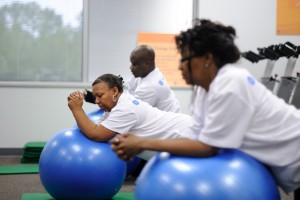HESRM Researchers Examine How Exercise Combats Aging
written by Michael Newsom for Ole Miss News
OXFORD, Miss. – Two University of Mississippi researchers have completed a study that sheds new light on how working out keeps human cells in good shape, which can stave off some of the physical problems associated with getting older.
Paul Loprinzi and Jeremy Loenneke, both assistant professors of health and exercise science at UM, worked with Elizabeth Blackburn, a professor at the University of California at San Francisco, on the study. In 2009, Blackburn shared a Nobel Prize for discovering the molecular nature of telomeres, which are the caps on the ends of human chromosomes. She also helped discover the ribonucleoprotein enzyme known as telomerase.
Telomeres protect cells from damage during replication but can shorten over time. Harnessing the fairly new science around telomeres may hold the key to understanding how to slow the symptoms of aging.
“Telomeres cap the end of chromosomes,” Loprinzi said. “As we age, these telomeres shorten with each replication of the cell. There is some indication that some healthy lifestyle behaviors, such as exercise, can attenuate the progression of shortening of these telomeres.”
Telomeres are much like the cap on the end of a shoelace, Loprinzi explained. If the cap isn’t there, the lace frays. The same thing happens with human chromosomes.
“Once that telomere length gets too short, that can create DNA complications and associated morbidities,” Loprinzi said. “Although at this point it is not entirely clear whether telomere shortening is a cause or consequence of morbidity status, there is evidence to suggest that shorter telomeres are associated with increased cardiovascular and cancer risk.”

Two University of Mississippi researchers have completed a study that sheds new light on how excercise keeps human cells in good shape and delays some of the problems associated with the aging process.
The study has great potential to improve many people’s health, said Teresa Carithers, UM associate dean of applied sciences and professor of nutrition and hospitality management.
“The research study and findings by Dr. Loprinzi and Dr. Loenneke are a perfect example of ‘applied science research’ at its best,” Carithers said. “The applied science mission is to improve lives and well-being through science and service venues.
“These study outcomes have relevance to people everywhere and truly have potential to improve health outcomes by providing the foundation for future evidenced-based practice.”
The study, “Movement-Based Behaviors and Leukocyte Telomere Length Among U.S. Adults” was recently published in the journal Medicine & Science in Sports & Exercise.
The team examined data in the National Health and Nutrition Examination Survey from the U.S. Centers for Disease Control. Information from more than 6,000 people between the ages of 20 and 84 was split into four different groups.
Respondents were separated based on how they responded to questions about their workout habits, such as whether they had at any time during the past month lifted weights, or done moderate exercise such as walking or biking to work or school, or also more intense forms of cardiovascular exercise.
If they answered “yes” to questions, the researchers assigned them points. The researchers compared the points assigned to the respondents and then checked their telomere lengths using blood test results.
They found a correlation between having answered “yes” to physical activity questionnaires and having longer telomeres. For each point earned, their chances of having shorter telomeres declined.
If someone did only one of the activities listed, they earned a “1” and researchers found they were 3 percent less likely to have shorter telomeres than someone who doesn’t exercise. Shortened telomeres were 24 percent less likely in respondents who reported two types of exercise, 29 percent less likely in those reporting three types of exercise and 59 percent less likely in those who participated in all four modes of working out examined in the study.
“It suggests employing multiple modalities of exercise is the best option,” Loenneke said. “If you like to walk, maybe you can add lifting weights. If you only lift weights, maybe you can add walking and cycling at different intensities.”
The rate at which exercise improves longevity was strongest in the 40-to-64-year-old age group, researchers found. This means middle age may be a crucial time for someone to start their exercise regimen or keep up an existing one.
It’s not clear what constitutes an ideal amount of exercise to keep telomeres in good shape because the researchers didn’t have access to information about how often those in the study actually worked out. It’s also not clear that exercise definitely lengthens telomeres; only that those who reported exercising were more likely to have longer telomeres.
It is rewarding to have faculty scholars of Loprinzi and Loenneke’s caliber at Ole Miss, said Velmer Burton, dean of the university’s School of Applied Sciences.
“The impact of this research with Nobel laureate Elizabeth Blackburn holds great promise for improving our health and well-being,” Burton said. “It is our school’s mission to help improve the human condition, and our talented scholars continue to contribute to the discipline in the areas of physical activity and aging.”
UM researchers are following up the study with others on exercise and cognition, and the effect of a sedentary lifestyle on telomere length, among other topics.
Researchers said it’s clear that doing only forms of exercise someone enjoys is better than doing something they’re not likely to continue. Predictably, once regular exercise stops, benefits disappear.
“The continuous message we need to be sending is (that) you should be consistently exercising and doing exercises you want to do,”Loenneke said. “If you never see yourself jogging for long periods of time, it doesn’t make sense to do that. You should do exercises you want to do.”